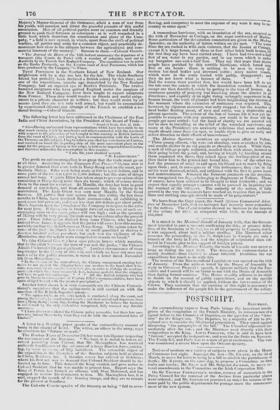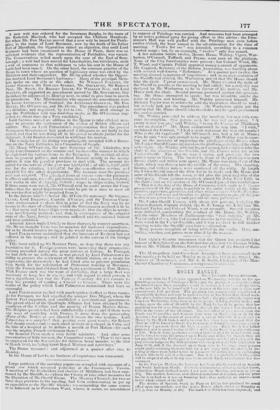Notices of motions on a variety of subjects were given
in the House of Commons last night. Amongst the rest—Mr. Ewa ur, on the 3d of March, to move for leave to bring in a bill to abolish the punishment of death ; Mr. Balsas, on time same day, to propose a Committee on first fruits and tenths ; Mr. Stia w and Mr. Sergeant JACKSON, to move se- veral amendments in the Committee on the Irish Corporation Bill. On Sir THOMAS FREMANTLE'S motion, returns of memorials to the Privy Council for the removal of the Assizes from particular places were ordered ; and Mr. C;OULHIJIIN procured an order for returns of the sums paid by the public departments for postage since the commence- ment of the new system.
new writ was ordered for the Inverness Burghs, in the room of Mr. Roderick Macleod, who had accepted the Chiltern Hundreds. But when Mr. Fox Manus moved that a new writ be issued for Perth- Aire, in the room of Lord Stormont, now by the death of his father Earl of Mansfield, the Opposition raised an objection, that until Lord Stormont had been summoned to the House of Peers, there was no sufficient evidence that the representation of Perthshire, was vacant. The Conservatives relied much upon the case of the Earl of Scar-
borough : a writ had been moved for Lincolnshire, but withdrawn, until a writ of summons to that nobleman to take his seat in the House of Lords had been issued. On the other hand, the common practice of the Rouse in cases where no question of legitimacy arose was cited by the Ministers and their supporters. Mr. Moine asked whether the Opposi- tion doubted Lord Stormont's legitimacy, Many of the principal Mem- bers spoke on one side or the other. Sir WILLIAM FOLLETT, Sir James GuAnAst, Sir EDWARD SUGDEN, Mr. GOI7LBIIN, Sir ROBERT PEEL, Mr. &taw, Sir ROBERT INGLIS, Sir WILLIAM RAE, and Lord STANLEY, all supported an amendment moved by Mr. COCLBURN, that theidebate be adjourned to Monday next, in order to give time to search for precedents. The Ministerialists who opposed the amendment were the LORD- Amway': of Scotland, the ATTORNEY-GENERAL, Mr. Fox 11.1Aut,v, Mr. O'CONNELL, and Mr. HumE. The amendment was pushed to a division ; and negatived, by 165 to 136. [This droll attempt to stop the Perthshire writ was doubtless made, as Mr. O'CoNNELL sug- aested, to obtain tune for a Tory candidate.]
Lord SANDON itinvi.d an address to the Queen to take efficient mea- sures to procure the settlement of the elehns of British officers and soldiers. But, on Lord Palmerston s representation that the present Portuguese Government bad professed w illinguess to net fairly in the matter, and that he was doing all in his power to obtain justice for the claimants, Lord Sandon consented to withdraw his motion.
The remainder of the sitting was principally occupied with a discus- sion on the Navy Estimates, in a Committee of Supply.
Mr. Motu OTEnn.mr., the new Secretary of the Admiralty, was justly complimented on the concise and business-like manner in which he explained the various items in the Esti:in:N.:. He avoided all allu- sions to general polities, and confined himself' strictly to the money matters it was his peculiar province to deal with. The amount re- quired for the service of the year was 5,6511,0511. ; of which, 3,957,5611. 'MB for the effective, 1.4.;e,275/. for the non-effective service, and 243,215/. for the other departments. The increase over the previous year was 461,0;10/. The principal items of excess were—for payments to officers and men, Go.oe0/.; provisions, 50,000/. ; naval stores, 136,0001.; new works in the &.elfyards, 70,0001,wages to shipm rights, 6o,00o/. If these sums were voted, Sir. ()Terrill; said he could assure the Com- mittee that the naval department would be put in a state to meet all the service that might be required from it.
In the debate which followed Mr. OTerrall's statement. Sir GEOI161.: ClAnitt, Lord I:ix:Es:Till:, Captain A'Counr, and Sir Ttio):As Coen- nAxF. endeavoured to show, that in point of fact the Navy was by no means in the state of elliciency which the Government asserted it to he in ; that more and larer ships '.vere required ; that the ships in service were insultleiently manned ; and that, in consequence of the crippled state or the Navy, foreiLi:il commerce suffered and the national honour uad been tarnished.
Admiral ADAM replied brielly to these charges, by counter assertions. thought there was no occasion for increased expenditure ; but as he should receive no support, he would not move an amendment. Lord PALMERSTON maintained that the interests of England had not suffered in his keeping; and he pointed to the success of his foreign policy.
This boast called up Sir RonEnT PEEL. to deny that there was any foundation for it. Foreign powers were increasing their armaments ; jealousy prevailed among the great nations of Europe. In Portugal, we had little or no influence, as was proved by Lord Palmerston's in- ability to procure the settlement of the British claims, or a treaty for suppressing the shire-trade: he had thiled also to procure permission front Spain for the celebration of Protestant worship at Havanna; while the French had obtained from Spain a settlement at Port Mahon. With France such was the want of cordiality, that a large fleet was necessary to keep her in cheek ; and with regard to other powers, it was a significant tlict that the Forei,aa 2Z..',21-,,tary did net venture to keep his promise of sending a Consul to Cracow. These were the results of the policy which Lord Palmerston maintained had been so successful.
Lord PALsiEnsyox relied with much spirit feel effect to these taunts. As for Portugal, we had expelled the usurper Don Miguel, whom Sir Robert Peel supported, and established a constitutional government. The grand object of the Quadruple Alliance had been obtained by the expulsion of the Carlists and the security of Donna Maria's throne. The Belgian question had been satisfactorily settled ; and if there were any want of cordiality with France, it arose from the persevering efforts of the Toriee to sow discord between the two nations. Lord Palmerston was surprised that, passing over great results, Sir Robert Peel should condesmnd to such small matters as a chapel iu Cuba, and the hire of a hospital at 16 dollars a month at Port Mahon-11)r such was the mighty French settlement there ! Sir RolinitT PEnt, made a very feeble rejoinder. And, after some conversation of little interest, the Committee voted, "'litat 33 163 men be employed !Or the Sea service for thirteen lunar months, to the 31st
of March 164 I, ling 9,000 Royal Marines and 2,000 boys."
The House resamed ; and adjourned at a quarter after one, to Monday. In the llonse of Lords, no business of importance was transacted.



























 Previous page
Previous page